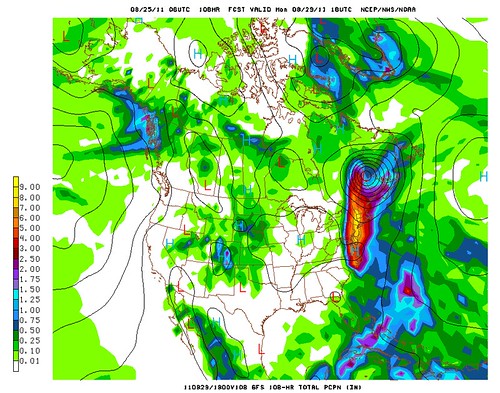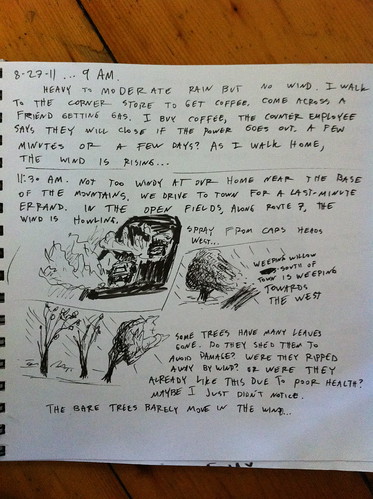Exactly a year ago today, we were at a different wedding (weddings and hurricanes seem to share peak seasons) and planning to leave early so we could get home before Irene hit Vermont. Like many people, I'd already been following the storm for several days, and knew it could be bad. No one really knew just how bad it would be... though a few computer models that most disbelieved ended up predicting the storm fairly accurately several days in advance:

Above, the GFS computer model predicts torrential rains in Vermont, four days in advance.
My friends and anyone else who was reading this blog a year ago will remember that we were evacuated from East Middlebury, where severe flooding took place. I'd been taking notes about the storm while it happened, but they end abruptly when we were told we had to leave.


Above: flood debris left in the Middlebury River by Irene.
East Middlebury was mostly spared, but other towns were not as lucky. As everyone now knows, the damage was catastrophic in many places. Many homes were destroyed and many more were trapped in their rural homes for many days. Thankfully, Vermont is sparsely populated and people are usually prepared for holing up for a few days, often during blizzards. The peak of the floods happened during the afternoon on a Sunday, so few were on the roads and people didn't have their homes collapse while they slept. The death toll was very low.
After the storm, people pulled together. We went to help out in Brandon, though many people did much more than we did. Websites, blogs, Google maps, and Twitter were widely used to coordinate repairs and volunteer efforts. The response was positive and very touching. Sadly though, a lot of damage to rivers was also done in the days after the storm, as people struggling to repair roads and protect themselves against the fear of future flooding took to the rivers to remove gravel and shore up levees. It seemed logical to many that removing gravel and straightening rivers might prevent future floods, but in reality, it can cause a lot of damage and make future flooding worse. I'm all for smart flood control and engineering that saves lives and homes, but in my view and that of many others, many of these projects did long-term damage to the rivers and also made them less safe in the future. Even yesterday, a year after Irene, in many areas the aftermath of these projects was still visible.

Above: a pile of rock left in the Middlebury River after attempts at gravel removal and river channelization were halted. The issue was very contentious in East Middlebury, with many people believing that these efforts, while very damaging to the river, made people safer. I still strongly disagree a year later.
Over the last year, the rivers have been adjusting to Irene's aftermath and the modifications people made to the rivers after the storm. It's been a dry year since then, and it has seemed like after Irene's passage the extreme weather of the previous year turned off, like a switch had been flipped. The fall was uneventful for the most part, the winter mild and boring (and a failure for snow), and the spring only notable for an extreme warm spell. This summer has been a warm and dry one, punctuated by a few severe thunderstorms that brought more wind and lightning than flooding. As summer winds down, there are no big storms immediately evident in the future. This year's 'I storm' could cause quite a few problems on the Gulf Coast, but if it brings anything to Vermont, it will probably just be needed rain.
Vermont has bounced back. Just as the forests regrew after their deforestation in the late 1800s, Vermont has culturally and economically and emotionally rebounded from Irene. We're not fully healed, but we've made good progress. Hopefully nature spares us any hurricanes this year, and the rebounding process can continue.
If anyone is interested in the history of hurricanes impacting New England, and doesn't mind some meteorological jargon, they should check out this scientific document, which my friend called to my attention this weekend. Irene was a nasty storm, and hopefully one we won't see the likes of for the next century, but in all likelihood other hurricanes will affect Vermont in the following decades. We would be wise to prepare for them in both the sort term and the long term.

Good post, Charlie. Sometimes a year feels too short - Irene hit my town so hard, and we've bounced back.
ReplyDelete